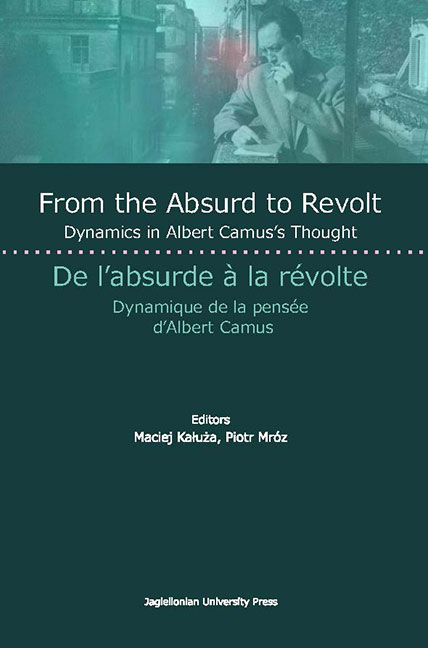Book contents
- Frontmatter
- Contents
- Introduction
- Part One From the Absurd to Revolt, Analysis of Sources for Camusian Concept of Revolt
- Part Two Camus's Revolt in Contemporary Analysis
- L’éthique camusienne comme aliment de résilience
- Le droit et le devoir de tuer: sémantiques du meurtre dans L'Homme révolté
- A “Culpabilité Raisonnable.” Camusian Revolt as Modern Morality
- Timeliness Forms of Revolt by Albert Camus
- Does Justice Require Victims? Reflections on Albert Camus's Thought
- Part Three Camus's Revolt in Comparatistic Studies
Timeliness Forms of Revolt by Albert Camus
from Part Two - Camus's Revolt in Contemporary Analysis
Published online by Cambridge University Press: 22 December 2017
- Frontmatter
- Contents
- Introduction
- Part One From the Absurd to Revolt, Analysis of Sources for Camusian Concept of Revolt
- Part Two Camus's Revolt in Contemporary Analysis
- L’éthique camusienne comme aliment de résilience
- Le droit et le devoir de tuer: sémantiques du meurtre dans L'Homme révolté
- A “Culpabilité Raisonnable.” Camusian Revolt as Modern Morality
- Timeliness Forms of Revolt by Albert Camus
- Does Justice Require Victims? Reflections on Albert Camus's Thought
- Part Three Camus's Revolt in Comparatistic Studies
Summary
The literature and philosophical thought of Albert Camus includes descriptions and analyses of the different forms of revolt against the contemporary human condition in the world. Camus opposes the colonial, wartime and occupational forms of oppression, as well as racial and cultural ones, in the name of the “Cosmic Idea of Man.” These problems are also valid nowadays in the globalized world and therefore the categories of revolt developed by the French thinker are still pertinent. We can say even that they are currently more expressive and have a larger scale.
INTRODUCTORY REMARKS
The situation of European Thought has changed radically in the modern period, mainly as a result of the anthropological and cognitive ideas created by René Descartes and John Locke. The social ground for acceptance of this way of thinking was prepared, on the one hand, by the social experience of the Reformation, on the other hand, by the Enlightenment and the Thought associated with the progressive process of democratization of the social texture of life. A special impetus to influence the widespread areas of these changes was given by the French Revolution and the Napoleonic wars that had spread the ideas, promoting individualization of human life in Europe, and after the Civil War, in North America.
The most decisive experiences for the development of the personalist and existential doctrines were the dramatic wartime events in the 20th century and the genocide and Holocaust, in the result of which millions of innocent victims died. Many nations and social groups have experienced the reversal and mishap in which the development of science and technology (intended for the improvement of the human condition in the world) contributed to the mass killing of people; following the ideologically founded objectification and deprivation of the right to dignity, leading to treatment worse than that of the proverbial wild animals or livestock. The trauma resulting from these experiences, especially in the dimension of mass, created a spiritual space to present a new question: “What is man?” In this context of the spontaneously developing mass society, aimed at social globalization, the question concerning the meaning of human existence was brought to the for ground with great force.
- Type
- Chapter
- Information
- From the Absurd to Revolt/De l'absurde a la Revolte , pp. 161 - 174Publisher: Jagiellonian University PressPrint publication year: 2017



